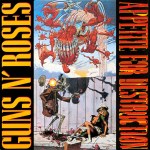- Twenty five years on from the peak of heavy rock’s commercial popularity in 1988, this series asks why heavy rockers no longer dominate the charts and seeks to highlight the crimes that Heavy Rock is accused of, and give you the cases for and against.
- At the end of each debate, you will have the ability to vote either “guilty” or “not guilty”, according to the evidence. And because this is a democratic process, you may also introduce your own evidence, in the comments section at the foot of the page to sway the jury.
- By the end of the process we should perhaps have a clearer view of what went wrong with those eighties rock bands, and the pitfalls new bands might do well to avoid…
It could be tempting to look back at poodle haired rockers now somewhat dismissively. Wasn’t it awful, you might tut, whilst leafing through your collection of Belle and Sebastian CDs. But if that is true, why was it the most popular type of rock? And why was it the sort of rock I liked the most?
It is a truth widely acknowledged that, in the vast majority of cases, the truly great rock acts of the last fifty years were auteurs. Even those that didn’t speak French still wrote their own songs. And the same is true for all the great eighties rock bands, right? That is what separated them from the pop acts of the day. Their music was real, honest and from the heart. When Jon Bon Jovi sang about Tommy and Gina and their financial problems when the union went on strike, that was all his own work, right?
Wrong. But I would guess you knew that already. What may be surprising is just how often “hit writers” were brought in to jazz up a few songs on an album and make something radio friendly.
Exhibits A, B and C: Desmond Child, Holly Knight and Jim Vallance.
The best known “song doctors” were Desmond Child, Holly Knight and Jim Vallance. Between them, they were responsible for co-writing a huge number of songs.
Here’s a few from Desmond Child (NB for brevity I have omitted many):
- Aerosmith: “Heart’s Done Time”, “Dude (Looks Like a Lady)”, “Angel”, “What It Takes”, “Crazy”, “Hole in My Soul”;
- Ricky Martin: “Livin’ la Vida Loca“, “She Bangs”.;
- Michael Bolton: “How Can We Be Lovers?”
- Bon Jovi: “You Give Love a Bad Name”, “Livin’ on a Prayer”, “I’d Die For You”, “Without Love”, “Bad Medicine”, “Born to Be My Baby”, “Blood on Blood”, “Keep the Faith”, “I’ll Sleep When I’m Dead”, “This Ain’t a Love Song”, “One Wild Night”
- Cher: “Just Like Jesse James”, “We All Sleep Alone”
- Alice Cooper: “Poison”, “Bed of Nails”, “This Maniac’s In Love With You”, “Trash”, “I’m Your Gun”
- KISS: “I Was Made For Lovin’ You”, “Heaven’s on Fire”, “King of the Mountain“, “Who Wants to Be Lonely”, “Uh! All Night”, “Reason to Live”, “Let’s Put The X In Sex”, “(You Make Me) Rock Hard”, “Hide Your Heart“;
- Ratt: “Lovin’ You’s a Dirty Job”, “Shame Shame Shame”, “Heads I Win, Tails You Lose”
- Katy Perry: “Waking Up In Vegas”
That’s quite a list! So what are the likes of Aerosmith and Kiss doing mixing with someone who writes with pop acts such as Ricky Martin and Katy Perry? Isn’t this the very antithesis of what rock music should be about? And were there any songs that Bon Jovi didn’t use an outside songwriter on?
Next up: Jim Vallance.
Jim Vallance formed a songwriting partnership with Bryan Adams, writing many of the hits on ’85 album “Reckless” (“Summer of ’69”, “Run To You”). If we think of Vallance and Adams as John / Taupin** or Jagger/ Richards I think we can say that is fair enough. That Reckless album is something of a classic, even if I don’t play it much nowadays (no need – they play it constantly on Absolute Radio). Meanwhile, Vallance also offered his songwriting services to help inject some creativity or mainstream sound into an artists songs. In many cases, the artist was in trouble with the recording company over falling sales. Either the artist had lost their creative edge or needed to adopt a more mainstream sound to gain airplay and boost sales. One of Vallance’s first clients, and the best example, was (once again) Aerosmith.
Vallance himself dislikes the “song doctor” and “consulting” monikers, which imply that he “fixes songs”. 98% of the time he sat in a room with one or two band members — guitar in hand and a blank note-pad nearby — and started writing “from scratch”. As he sees it, that makes him a “songwriter” rather than a “song doctor” or “consultant”. Vallance also co-wrote with Alice Cooper, Roger Daltrey, Europe, Ted Nugent, Quireboys, Rod Stewart, 38 Special and on the following specific songs:
- Aerosmith – Magic Touch, The Other Side, Ragdoll, Get a Grip, Young Lust.
- Jimmy Barnes – I’m Still on your Side, Lessons In Love
- Kiss – War Machine
- Scorpions – Restless Nights, Crazy World
Finally we have Holly Knight.
Knight helped with the resurgence of Heart, and wrote Pat Benatar‘s and Tina Turner‘s best known hits, including “(Simply) The Best”. Here’s what Holly wrote or co-wrote:
- Ace Frehley / Kiss / a few others – “Hide Your Heart”
- Aerosmith – “Rag Doll” (with Steven Tyler, Joe Perry, and Jim Vallance) Animotion – “Obsession” (with Michael Des Barres);
- Jimmy Barnes – “Between Two Fires”
- Pat Benatar – “Love Is a Battlefield”; “Invincible”; “Sometimes the Good Guys Finish First”; “Girl”
- Bon Jovi – “Stick to Your Guns”
- Heart – “Never”; “All Eyes”; “There’s the Girl”; “Tall. Dark, Handsome Stranger”; “I Love You”
- KISS – “Hide Your Heart”; “I Pledge Allegiance to the State of Rock & Roll”; “Raise Your Glasses”
- Tina Turner – “Better Be Good to Me”; “One of the Living”; “(Simply) The Best”.
The extent of this co-writing was vast, doubtless fuelled by record companies and compliant and ambitious bands. Was the public buying Bon Jovi or Desmond Child? I had wondered whether my preference for Aerosmith’s seventies output was some form of unconscious music snobbery, but it is now clear that isn’t the case. It’s because the songs were written by someone else. The problem with this approach is that the integrity of the music is more likely to be compromised. When Tyler sang on “Combination” from 1975’s Rocks album, “Walking on Gucci / Wearing Yves St Laurent / Barely stand up / ‘cos I’m so goddam gaunt” we knew this was his rather drug-addled story. It’s not pretty, but it’s real. When we hear “Rag doll / Living in a movie” we can safely assume we are not plundering the depths of Tyler’s soul. And that’s a shame, because there must be quite a few depths to plunder.
Perhaps the reason that hair metal’s popularity faded was because the public liked the pop songs written to Child, Knight and Vallance’s formula. When the formula got tired, the public moved on to something new, and the bands that had used outside writers were left stranded.
Exhibit D: Vinnie Vincent. When The Use Of Outside Writers Goes Wrong.
Vinnie Vincent was sued by little known former New England vocalist Hirsch Gardner over the rights to five songs on the first Vinnie Vincent Invasion LP which Gardner claimed he co-wrote whilst never being credited.* This is quite extraordinary. Quite why anyone would want to claim credit for these songs I’m not sure. I can only think the fight was to get the other to admit liability…
The Defence:
Exhibit E: Guns n Roses – Appetite For Destruction.
One of the best and biggest selling albums of the eighties was Guns n Roses’ Appetite For Destruction. Did that feature Desmond Child? No. Is it any good? Of course it is.
It is worth asking just how many songs released by eighties rockers didn’t have outside writing expertise. When it comes to actual hit singles far from being widespread, the use of “hit makers” or “song doctors” appears to have been limited to just a few acts. I reckon there were about 94 hair metal singles that reached the top 40 in the UK between ’85 and ’92. (And when I say “I reckon”, I counted that many – so unless I forgot an act or two I think that’s on the money).
Of these, the vast majority (more than 80%) were not co-written by Vallance, Knight and Child. The bands most reliant upon outside writers were Bon Jovi, Aerosmith and Alice Cooper. But most of the bands that had top 40 hits, such as Guns n Roses, Poison, Def Leppard, Van Halen, et al wrote their own songs. Even Skid Row did.
Exhibit F: Aretha Franklin
Finally, who says you have to write your own songs? No-one ever said Aretha Franklin was no good because Goffin and King – or Otis Redding – wrote a song or two for her.
Aerosmith had already proven themselves in the seventies as songwriters – their seventies albums remain classics. The use of outside songwriters was a deliberate attempt to become more commercial in order to recoup some of the money they had snorted up their noses in the previous two decades. There’s still something of Aerosmith in those newer songs, and actually some of the output from Child, Vallance et al is pretty good.
In summary, whilst Bon Jovi relied upon outside songwriters, we can see that the vast majority of acts that subsequently charted wrote their own songs. We might judge Bon Jovi to have been over-reliant upon outside writers, but most heavy rockers – and even those who were most commercial and had hit singles – did not.
- It’s Time To Vote!
- Were Aerosmith and their ilk wrong to use outside “hit doctors” to commercialise their sound? Or is it simply a way to improve songs by collaborating with people who bring a fresh perspective to things?
- Vote GUILTY if you think the use of outside writers was a crime and over-prevalent.
- Vote NOT GUILTY if you think the majority of acts made up for the likes of Jovi and Aerosmith.
- SWAY the jury by sharing your views below!
* Source: Raw Magazine issue 17
** Although Vallance wrote words and music, unlike Taupin, who is a lyricist solely.
Record #248: Aerosmith – Heart’s Done Time





Leave a comment